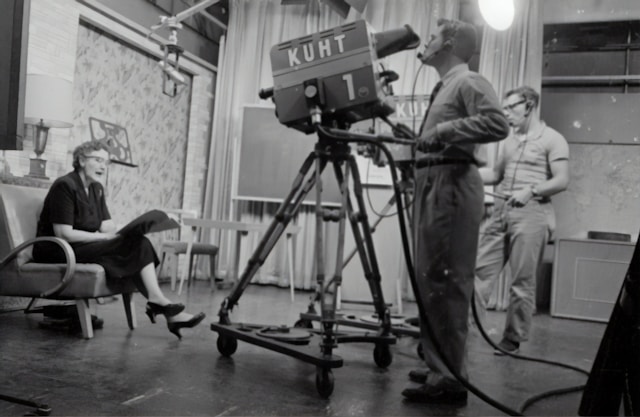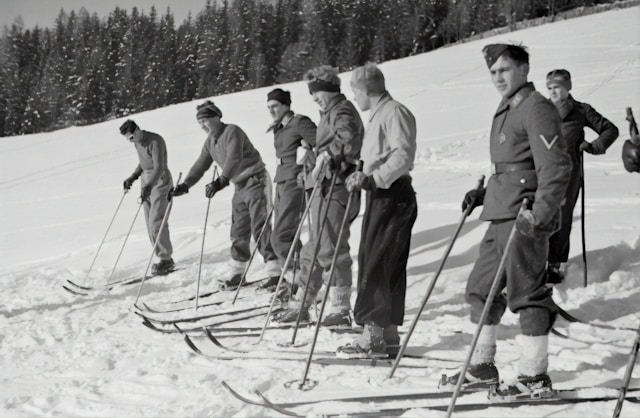Historical Biopics: A Window into the Past
Historical biopics have long been a popular genre in both film and television, offering audiences a glimpse into the lives of notable historical figures. These works serve as a window into the past, allowing viewers to immerse themselves in the events and cultures of bygone eras. Through the lens of these biographical dramas, audiences are transported back in time to witness the triumphs, struggles, and complexities of historical figures who have left a lasting impact on society.
By delving into the personal and public lives of historical figures, biopics offer a unique perspective on the individuals who have shaped our world. Through careful attention to detail in costume, set design, and casting, these productions strive to recreate the essence of a particular time period, bringing history to life in a visually compelling way. As viewers engage with these stories, they not only gain a deeper understanding of the past but also develop a greater appreciation for the human experiences that transcend time and place.
• Historical biopics provide a glimpse into the lives of notable historical figures
• These works allow viewers to immerse themselves in bygone eras
• Audiences are transported back in time to witness triumphs, struggles, and complexities of historical figures
• Biopics offer a unique perspective on individuals who have shaped our world
• Attention to detail in costume, set design, and casting brings history to life visually
• Viewers gain a deeper understanding of the past and develop appreciation for human experiences that transcend time
The Art of Storytelling Through Historical Drama
Historical drama has long been a powerful way to bring the past to life, offering audiences a glimpse into the lives and events that have shaped our world. Through the art of storytelling in historical dramas, filmmakers and television producers have the opportunity to not only entertain viewers but also educate them about significant moments in history. By delving into the personal stories of historical figures, these dramas humanize the past, allowing audiences to connect on a deeper level with the events being portrayed.
The use of historical settings, costumes, and dialogue in these dramas helps to create a rich and immersive experience for viewers. From intricate period costumes to elaborate set designs, every detail is carefully crafted to transport audiences to a different time and place. Through the skillful blending of fact and fiction, historical dramas strive to capture the essence of a particular time period while also engaging audiences with compelling storytelling. This blending of historical accuracy and dramatic flair allows viewers to not only learn about history but also experience it in a unique and captivating way.
• Historical dramas bring the past to life, offering audiences a glimpse into significant moments in history.
• By delving into the personal stories of historical figures, these dramas humanize the past for viewers.
• The use of historical settings, costumes, and dialogue creates a rich and immersive experience for audiences.
• Every detail in historical dramas is carefully crafted to transport viewers to a different time and place.
• Historical dramas blend fact and fiction to capture the essence of a particular time period while engaging audiences with compelling storytelling.
The Evolution of Historical Biopics on Television
Biopics have long been a popular genre in both film and television, offering audiences a glimpse into the lives of historical figures. When it comes to television, the evolution of historical biopics has seen a shift towards more complex and nuanced portrayals of these figures. Unlike earlier portrayals that may have painted historical figures in a more simplistic light, modern TV biopics are delving deeper into the complexities of their characters, showcasing their flaws and humanizing them in a way that resonates with viewers.
Furthermore, the evolution of historical biopics on television has also brought about a greater emphasis on authenticity and accuracy. With advancements in research methods and a growing demand for historical accuracy, TV biopics are now striving to portray events and characters in a more truthful light. This dedication to historical fidelity not only adds depth to the storytelling but also serves to educate audiences about the past in a compelling and engaging way.
• One of the key aspects of the evolution of historical biopics on television is the shift towards more complex and nuanced portrayals of historical figures.
• Modern TV biopics are delving deeper into the complexities of their characters, showcasing their flaws and humanizing them in a way that resonates with viewers.
• There has been a greater emphasis on authenticity and accuracy in TV biopics, with advancements in research methods contributing to more truthful portrayals of events and characters.
• This dedication to historical fidelity not only adds depth to the storytelling but also serves to educate audiences about the past in a compelling and engaging way.
The Impact of Historical Biopics on Popular Culture
Historical biopics have had a profound impact on popular culture, captivating audiences and bringing the past to life in a compelling and accessible way. By shedding light on the lives and legacies of historical figures, these films and TV shows have sparked a renewed interest in history and inspired countless viewers to delve deeper into the events and personalities that have shaped our world. Through the power of storytelling and visual representation, historical biopics have the ability to educate, entertain, and provoke thought, bridging the gap between the past and the present.
Moreover, historical biopics have not only influenced popular culture but have also shaped the way in which society views and interprets history. By offering a dramatized yet engaging portrayal of real-life events and individuals, these productions have the ability to humanize historical figures and showcase the complexities of their lives, beliefs, and struggles. In doing so, historical biopics have the potential to challenge preconceived notions, spark conversations, and encourage a deeper understanding of the past, ultimately leaving a lasting imprint on the collective consciousness of society.
• Historical biopics bring the past to life in a compelling and accessible way
• These films and TV shows have sparked renewed interest in history
• They inspire viewers to delve deeper into events and personalities that shaped our world
• Historical biopics educate, entertain, and provoke thought by bridging the gap between past and present
• Biopics influence popular culture and shape society’s view of history
• They humanize historical figures and showcase the complexities of their lives
• These productions challenge preconceived notions and encourage deeper understanding of the past
• Historical biopics leave a lasting imprint on society’s collective consciousness.
Uncovering the Lives of Historical Figures Through TV
Television has become a powerful medium for delving into the lives of historical figures, offering audiences a glimpse into the past like never before. Through carefully crafted biopics, viewers are transported back in time to witness the triumphs, struggles, and complexities of notable individuals who have shaped history. These TV portrayals not only entertain but also educate, shedding light on the personal stories behind the public personas of iconic figures.
By bringing historical figures to life on screen, television biopics provide a humanizing perspective that goes beyond the history books. Viewers are able to connect with these individuals on a more personal level, experiencing their joys and sorrows, motivations and decisions. Through meticulous research and attention to detail, TV biopics strive to capture the essence of these historical figures, offering a nuanced portrayal that adds depth and dimension to our understanding of the past.
• Television has become a powerful medium for delving into the lives of historical figures
• Viewers are transported back in time to witness the triumphs, struggles, and complexities of notable individuals
• TV portrayals not only entertain but also educate by shedding light on personal stories behind public personas
By humanizing historical figures through television biopics, audiences gain a deeper understanding of the past. These portrayals allow viewers to see beyond the names and dates in history books, connecting with these individuals on a more intimate level. Through compelling storytelling and authentic performances, TV biopics bring these historical figures to life in a way that resonates with modern audiences.
Moreover, television offers a visual medium through which we can explore the environments and relationships that shaped these iconic figures. From their childhood experiences to their rise to fame or power, TV biopics provide insight into the influences that molded these individuals into who they became. By immersing viewers in the world of historical figures, television allows us to appreciate the context in which their actions took place and understand how they navigated challenges and opportunities during their lifetimes.
• Television biopics humanize historical figures for deeper understanding
• Portrayals connect viewers with individuals on an intimate level
• Visual medium explores environments and relationships shaping iconic figures
The Importance of Accuracy in Historical Biopics
Accuracy is paramount when it comes to depicting historical events and figures in biopics. Viewers expect a certain level of authenticity in order to truly engage with the narrative being presented on screen. Inaccuracies in historical biopics can not only mislead audiences but also distort our understanding of the past, shaping false perceptions and misconceptions about the individuals and events being portrayed.
Every detail, from the costumes to the dialogue, must be meticulously researched and executed to accurately reflect the time period and historical context. Even the smallest inaccuracies can detract from the overall impact of the story and compromise the integrity of the biopic. Filmmakers and creators have a responsibility to uphold the truth and present a faithful representation of history, respecting the legacy and contributions of the individuals they are depicting.
• Inaccuracies in historical biopics can lead to the perpetuation of stereotypes and misinformation.
• By staying true to historical facts, filmmakers can provide audiences with a more enriching and educational experience.
• Accurate portrayals in biopics also honor the memory of those who have shaped our world through their actions and achievements.
The Challenges of Adapting History for Television
Adapting history for television presents a myriad of challenges for filmmakers and creators. One major obstacle is the need to condense complex historical events and figures into a limited runtime while still maintaining accuracy and authenticity. Balancing entertainment value with historical fidelity is a delicate tightrope walk that requires careful consideration and skillful storytelling.
Moreover, the visual and narrative requirements of television can sometimes clash with the nuances of historical accuracy. The pressure to captivate audiences and maintain viewer engagement can lead to creative liberties being taken with historical facts and figures. Striking a balance between artistic expression and historical truth can be a constant struggle for those involved in bringing historical stories to the small screen.
• Adapting history for television requires condensing complex events and figures into limited runtime
• Balancing entertainment value with historical accuracy is a delicate tightrope walk
• Visual and narrative requirements of television can clash with historical nuances
• Pressure to captivate audiences can lead to creative liberties being taken with historical facts
• Striking a balance between artistic expression and historical truth is a constant struggle
Exploring the Themes of Power and Politics in Historical Biopics
Historical biopics often delve into the intricate themes of power and politics, shining a light on the complex dynamics that shape societies and individuals. These narratives meticulously portray the struggles for authority, the machinations of rulers, and the consequences of political decisions on a grand scale. Through the lens of historical figures and events, viewers are transported back in time to witness the high-stakes games of power play and the far-reaching implications of political maneuvering.
The characters in historical biopics, whether they be monarchs, politicians, or revolutionaries, are often depicted navigating a treacherous landscape of power struggles and alliances. Their actions and choices are not merely personal, but carry immense weight in shaping the course of history. As audiences witness the rise and fall of these influential figures, they are confronted with moral dilemmas, ethical quandaries, and the eternal quest for power and control. The exploration of power dynamics in historical biopics offers a captivating portrayal of human ambition, intrigue, and the timeless pursuit of dominance.
• Historical biopics provide a glimpse into the struggles for authority and the consequences of political decisions
• Characters in historical biopics navigate treacherous power struggles and alliances
• Viewers are confronted with moral dilemmas, ethical quandaries, and the eternal quest for power and control
• The exploration of power dynamics offers a captivating portrayal of human ambition, intrigue, and dominance
The Role of Costume and Set Design in Historical Biopics
Costume and set design play a pivotal role in bringing historical biopics to life on screen. The attention to detail in recreating the fashion and aesthetic of a specific time period adds authenticity to the storytelling. The intricate costumes worn by characters and the elaborate sets they inhabit create a visual spectacle that transports viewers back in time, immersing them in a bygone era.
Furthermore, costume and set design not only serve as a backdrop for the narrative but also help to establish the characters’ personalities and social status. The choice of attire and the environment in which a character exists can provide valuable insights into their background, motivations, and relationships. A well-executed costume and set design can enhance the overall storytelling experience, helping to evoke the mood and atmosphere of the historical period being depicted.
• The attention to detail in costume and set design adds authenticity to historical biopics
• Intricate costumes and elaborate sets transport viewers back in time, immersing them in a bygone era
• Costume and set design help establish characters’ personalities, social status, background, motivations, and relationships
• Well-executed costume and set design can enhance the overall storytelling experience
• They evoke the mood and atmosphere of the historical period depicted
The Significance of Casting in Historical Biopics
Casting plays a crucial role in bringing historical figures to life on screen. The choice of actors to portray these characters can greatly impact the authenticity and believability of the biopic. A skilled actor not only embodies the physical characteristics of the individual being portrayed but also captures the essence of their personality and emotions.
The success of a historical biopic often hinges on the ability of the cast to immerse viewers in the time period and story being depicted. Through meticulous casting decisions, filmmakers can transport audiences back in time and make them feel connected to these iconic figures from history. The right casting can elevate a biopic from a mere retelling of events to a captivating and immersive experience that resonates with viewers long after the credits roll.
• Casting plays a crucial role in bringing historical figures to life on screen.
• The choice of actors greatly impacts the authenticity and believability of the biopic.
• Skilled actors embody physical characteristics and capture personality and emotions.
• Success of a historical biopic relies on cast’s ability to immerse viewers in the time period.
• Meticulous casting decisions transport audiences back in time and create connection with iconic figures.
• Right casting can elevate a biopic from mere retelling of events to captivating experience.
The Influence of Historical Biopics on Audience Perception
Historical biopics have a profound impact on audience perception by offering a window into the lives of prominent figures from the past. Through the portrayal of historical events and individuals, these films and television series shape how viewers perceive the past, often influencing their understanding of key moments in history. By bringing to life the struggles, triumphs, and complexities of real-life figures, historical biopics have the power to evoke empathy, admiration, and introspection among audiences.
Furthermore, historical biopics have the potential to spark interest in lesser-known historical events and figures, prompting viewers to delve deeper into the rich tapestry of the past. By shedding light on the lives of extraordinary individuals and the societal contexts in which they lived, these biopics serve as educational tools that inspire curiosity and a deeper appreciation for history. As audiences engage with the personal stories and struggles depicted in historical biopics, they are encouraged to reflect on the impact of historical events and the individuals who shaped the course of history.
• Historical biopics offer a window into the lives of prominent figures from the past
• These films shape how viewers perceive key moments in history
• They evoke empathy, admiration, and introspection among audiences
• Biopics can spark interest in lesser-known historical events and figures
• Serve as educational tools that inspire curiosity and appreciation for history
• Encourage reflection on the impact of historical events and individuals who shaped history
The Connection Between History and Entertainment in Biopics
The fusion of history and entertainment in biopics serves as a captivating medium through which audiences can immerse themselves in the past. By depicting the lives of historical figures in a dramatic and engaging manner, these films and TV shows offer viewers a glimpse into the events and personalities that have shaped our world. Through the art of storytelling, biopics bring historical narratives to life, making them accessible and relatable to a wide audience.
Moreover, the connection between history and entertainment in biopics allows for a creative exploration of the human experience within the context of real-life events. By weaving together facts and fiction, these productions offer a unique perspective on the complexities of history and the individuals who have left their mark on it. Through compelling storytelling and vivid portrayals, biopics not only entertain but also educate, shedding light on the triumphs, struggles, and motivations of figures from the past.
• Biopics offer a captivating medium for audiences to immerse themselves in the past
• They depict the lives of historical figures in a dramatic and engaging manner
• These films and TV shows bring historical narratives to life, making them accessible and relatable
• The fusion of history and entertainment allows for a creative exploration of the human experience within real-life events
• By weaving together facts and fiction, biopics offer a unique perspective on history
• They shed light on the triumphs, struggles, and motivations of figures from the past through compelling storytelling.
The Success of Historical Biopics in Capturing the Essence of the Past
Historical biopics have long been praised for their ability to transport audiences back in time and immerse them in the lives of the past. Through meticulous attention to detail in set design, costumes, and dialogue, these films and TV shows create a vivid depiction of historical events and figures. The success of historical biopics lies in their dedication to capturing the essence of the past, bringing to life the struggles, triumphs, and complexities of historical characters in a way that resonates with modern viewers.
By carefully balancing historical accuracy with engaging storytelling, historical biopics manage to educate and entertain audiences simultaneously. Whether exploring the lives of iconic leaders, unsung heroes, or ordinary individuals caught in extraordinary circumstances, these productions breathe life into history and spark curiosity about the past. The success of historical biopics in capturing the essence of the past lies in their ability to humanize historical figures, making their stories relatable and inspiring empathy and understanding among viewers.
• Historical biopics transport audiences back in time and immerse them in the lives of the past
• Meticulous attention to detail in set design, costumes, and dialogue creates a vivid depiction of historical events and figures
• Balancing historical accuracy with engaging storytelling educates and entertains audiences simultaneously
• Humanizing historical figures makes their stories relatable and inspires empathy among viewers
The Ethics of Dramatizing Real-Life Events in Biopics
Dramatizing real-life events in biopics raises ethical concerns regarding the portrayal of historical figures and events. Filmmakers often encounter dilemmas when deciding how much creative license to take when adapting true stories for entertainment purposes. Balancing the need for engaging storytelling with respect for the integrity of the past can be a complex task that requires careful consideration.
While artistic freedom allows for creative interpretations of historical events, it is essential for filmmakers to maintain a level of accuracy and authenticity in their portrayals. Straying too far from the truth can not only distort historical facts but also disrespect the memories of those who lived through the events being depicted. Audiences have a responsibility to critically evaluate the ethical implications of dramatizing real-life events in biopics and question how much artistic liberty is acceptable in representing history on screen.
• Filmmakers must strike a balance between entertainment value and historical accuracy
• Creative interpretations should not compromise the integrity of the past
• Distorting historical facts can disrespect the memories of those involved
• Audiences play a role in evaluating the ethical implications of biopics
The Intersection of Fact and Fiction in Historical Biopics
Historical biopics often find themselves straddling the line between fact and fiction, presenting a complex blend of historical accuracy and creative storytelling. Filmmakers face the challenge of balancing the need to entertain audiences with the responsibility to remain true to the facts. This delicate balance can lead to various interpretations of historical events, figures, and settings, sparking debates among historians, viewers, and critics alike.
The intersection of fact and fiction in historical biopics has raised questions about the ethical implications of dramatizing real-life events for the sake of entertainment. While some argue that creative liberties are necessary to engage modern audiences, others emphasize the importance of preserving the integrity of historical accuracy. The tension between storytelling and historical authenticity underscores the complexities of adapting true stories for the screen and navigating the blurred boundaries between reality and dramatization.
• Historical biopics often blend historical accuracy with creative storytelling
• Filmmakers must balance the need to entertain with the responsibility to remain true to facts
• Various interpretations of historical events, figures, and settings can spark debates among historians, viewers, and critics
• Ethical implications of dramatizing real-life events for entertainment have been questioned
• Creative liberties are seen as necessary by some to engage modern audiences
• Preserving historical accuracy is emphasized by others
• The tension between storytelling and historical authenticity highlights the complexities of adapting true stories for the screen
The Cultural Impact of Historical Biopics on Society
Historical biopics have a profound influence on society, shaping our perceptions of the past and the individuals who have played significant roles in history. Through the medium of television, these biopics bring to life the stories of historical figures, allowing viewers to engage with the complexities of their lives and the context in which they lived. By presenting these narratives in a compelling and accessible manner, historical biopics have the power to educate, inspire, and provoke thoughtful reflection on the impact of these figures on society.
Furthermore, the cultural impact of historical biopics extends beyond mere entertainment, as it creates a bridge between the past and the present, fostering a deeper appreciation for the events that have shaped our world. By offering a glimpse into the lives of historical figures and the challenges they faced, these biopics prompt audiences to consider the enduring themes of power, ambition, and resilience that resonate across generations. In doing so, historical biopics not only entertain but also serve as a catalyst for meaningful conversations about the lessons we can learn from the past.
• Historical biopics bring to life the stories of significant historical figures
• They allow viewers to engage with the complexities of their lives and the context in which they lived
• These narratives are presented in a compelling and accessible manner
• Historical biopics have the power to educate, inspire, and provoke thoughtful reflection on the impact of these figures on society
• Biopics create a bridge between the past and present
• They foster a deeper appreciation for events that have shaped our world
• Audiences are prompted to consider enduring themes such as power, ambition, and resilience
• Historical biopics serve as catalysts for meaningful conversations about lessons from the past
The Legacy of Historical Biopics in Shaping Historical Narratives
Historical biopics play a crucial role in shaping the way we perceive and understand historical narratives. By bringing to life the stories of notable figures from the past, these films and television shows have the power to immortalize the impact and legacy of these individuals. Through their portrayal of key events and personal struggles, historical biopics offer viewers a glimpse into the lives of those who have significantly influenced our world.
Moreover, these biopics not only entertain audiences but also educate and inspire them. By delving into the complexities of historical events and figures, these visual representations help to humanize the past and make it more relatable to contemporary audiences. Through the emotional depth and authenticity portrayed on screen, historical biopics leave a lasting impression on viewers, prompting them to delve deeper into the annals of history and fostering a greater appreciation for the individuals who have shaped our collective story.
• Historical biopics bring to life the stories of notable figures from the past
• They immortalize the impact and legacy of historical individuals
• These films offer a glimpse into the lives of influential figures
• Biopics entertain, educate, and inspire audiences
• Visual representations humanize the past and make it relatable
• Emotional depth and authenticity leave a lasting impression on viewers
The Future of Historical Biopics in Television
The future of historical biopics in television appears to be promising, with audiences showing a growing appetite for compelling stories rooted in the past. As technology advances and production value increases, we can expect to see even more visually stunning and immersive portrayals of historical events and figures on the small screen. With streaming platforms investing heavily in original content, the landscape for historical biopics seems poised for continued growth and innovation.
Furthermore, the increasing diversity in storytelling perspectives and the exploration of lesser-known historical figures are likely to shape the future of historical biopics. Audiences are increasingly drawn to narratives that offer fresh insights into the past, shedding light on untold stories and marginalized voices. This trend towards inclusivity and authenticity in storytelling will likely drive the development of historical biopics, offering a more comprehensive and diverse tapestry of historical narratives for viewers to engage with and learn from.
• As technology advances and production value increases, we can expect visually stunning portrayals of historical events
• Streaming platforms investing heavily in original content will lead to more historical biopics on television
• Increasing diversity in storytelling perspectives will shape the future of historical biopics
• Exploration of lesser-known historical figures will offer fresh insights into the past
• Trend towards inclusivity and authenticity in storytelling will drive development of historical biopics
The Resurgence of Interest in Historical Biopics
The resurgence of interest in historical biopics can be attributed to a growing fascination with uncovering the lives of influential figures from the past. Audiences are drawn to the rich tapestries of history that biopics weave, offering a glimpse into the personal struggles, triumphs, and defining moments of historical icons.
In today’s fast-paced world, historical biopics serve as a bridge between the past and the present, providing a window into the lives of those who have shaped our world. Through compelling storytelling and attention to detail, these biopics not only entertain but also educate, sparking a renewed appreciation for the individuals and events that have left an indelible mark on history.
• Historical biopics offer a deeper understanding of the complexities and nuances of historical figures
• Audiences are drawn to the authenticity and realism portrayed in historical biopics
• The resurgence of interest in historical biopics reflects a desire for meaningful storytelling that resonates with viewers
The Enduring Appeal of Historical Biopics on TV
The enduring appeal of historical biopics on television lies in their ability to transport viewers to different eras and immerse them in the lives of fascinating historical figures. These dramas offer a glimpse into the past, bringing to life the triumphs, struggles, and complexities of real-life individuals who have shaped history. Through intricate storytelling and compelling performances, historical biopics provide a rich tapestry of narratives that captivate audiences and ignite their curiosity about the past.
The allure of historical biopics also stems from the way they bridge the gap between entertainment and education. By presenting history in a visually captivating and emotionally engaging manner, these television dramas make learning about the past both accessible and entertaining. Viewers are not only entertained by the dramatic retelling of historical events but also inspired to delve deeper into the lives of the figures portrayed on screen. As a result, historical biopics continue to resonate with audiences of all ages, maintaining their enduring appeal in the realm of television storytelling.
• Historical biopics transport viewers to different eras and immerse them in the lives of fascinating historical figures
• These dramas bring to life the triumphs, struggles, and complexities of real-life individuals who have shaped history
• Intricate storytelling and compelling performances provide a rich tapestry of narratives that captivate audiences
• They bridge the gap between entertainment and education by presenting history in a visually captivating manner
• Viewers are inspired to delve deeper into the lives of historical figures portrayed on screen




